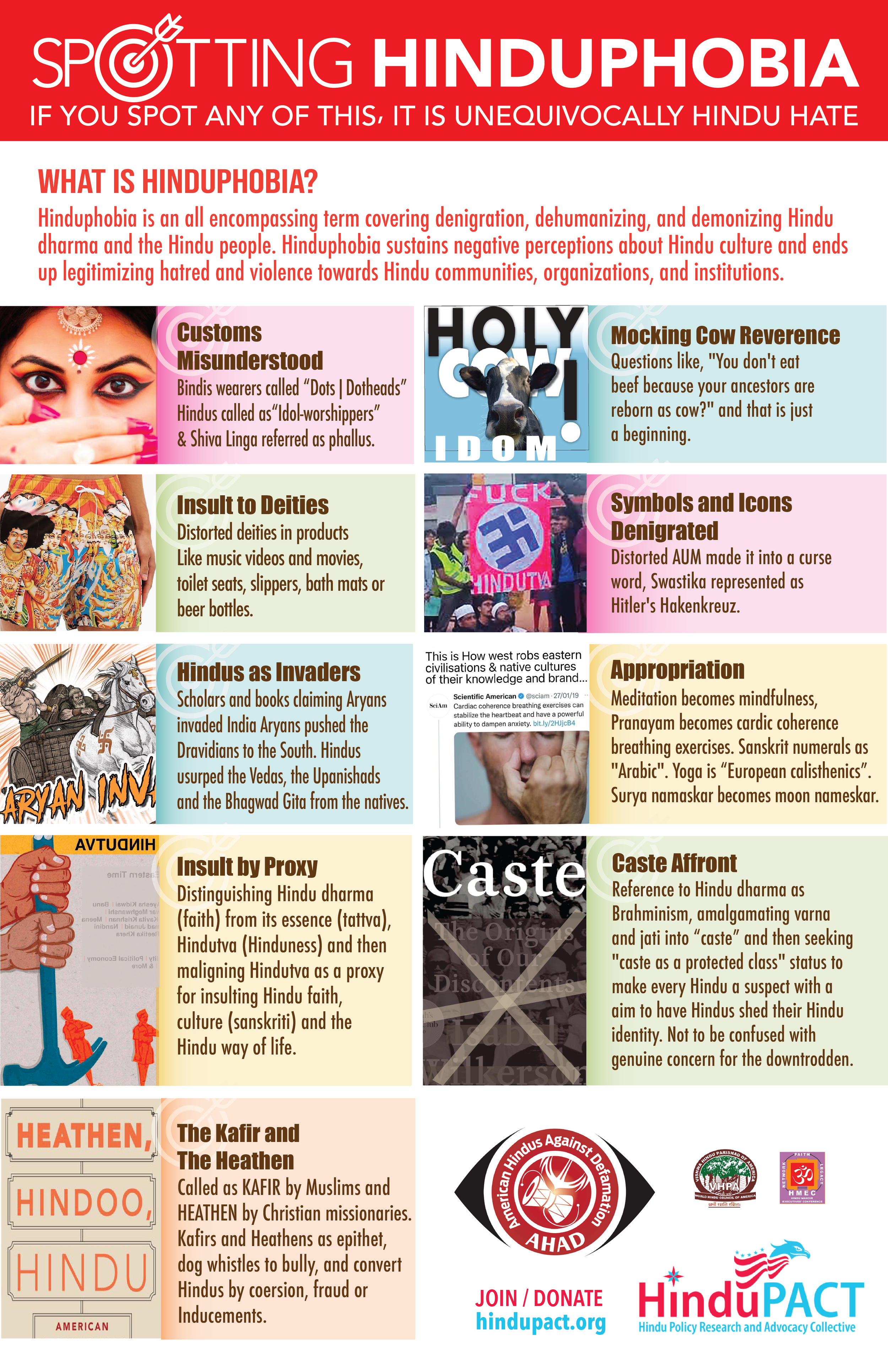Hindudvesha
VISION
Educate society about the phenomenon of Hindudvesha (i.e., systemic Hinduphobia), embed it in the consciousness of the world, and develop the Hindu capacity to resist it
MISSION
Explore and expose Hindudvesha through research, analysis, education and response.
WHAT IS HINDUDVESHA
Dvesha is a Sanskrit word meaning “aversion”, “repulsion” or “hatred.”
It is a way of talking about the Hindus, as a singular homogenous community that both presupposes and concludes that something about the Hindus and Hinduism is irredeemably bad and wrong, evil and demonic.
It legitimizes and even calls for violence toward the Hindus. It may appear to be seeking legitimate reform of Hinduism, but is really preparing the ground for a total ethnocide of the Hindus.
It is a way of gaslighting the Hindus, that is fundamentally accusatory, that relentlessly problematizes, dehumanizes, and demonizes the Hindus, treating them as objects or patients to be examined and diagnosed.
The pervasiveness of this discourse can be observed in the phenomenon where many Hindus are themselves purveyors of Hindudvesha, having been formerly victims of it.
Thus, they are simultaneously both victims and perpetrators, without any awareness that their understanding and attitudes have been shaped by sustained, centuries-long gaslighting.
FOR MANY, HINDUDVESHA CAN BE A LUCRATIVE CAREER
Hindudvesha is not merely a personal hatred directed toward a Hindu, in an occasional one-on-one interaction. It is an ideological position, that is constituted by settled and sustained negative perspectives and attitudes towards Hindu Dharma. It is institutionalized by endless propaganda and repetition of the supposed irredeemable deformities of Hindu Dharma.
For example, if a Christian or a Muslim commits a crime, it is generally regarded as an exceptional or abnormal act, i.e., that he or she committed that crime in spite of being a Christian or a Muslim. Hindudvesha denies the same charity to the Hindu. Instead, it is assumed a priori that the Hindu committed the crime because he or she is Hindu, i.e., that somehow it was Hinduism that made that person a criminal. As a form of rhetoric, it conflates the exception and the norm. It implies and explicitly traces all abnormalities and deficiencies in Hindu society back to some root cause that lies within Hinduism itself.
So, even if billions of interactions every day do not involve violence or discrimination, that would be deemed insufficient to demonstrate the character of the Hindu – the one exceptional act of violence would suffice to show definitely the degeneracy and illegitimacy of the Hindu, and will get played up disproportionately in the media and the academia. This is Hindudvesha and it puts the Hindus on the defensive.
SPOTTING HINDUDVESHA
If, as a Hindu,
- You find yourself wondering why the Hindus are being targeted with so much sustained negative and accusatory rhetoric.
- You are in any way embarrassed or ashamed of your Hindu heritage.
- You find yourself being interrogated for the apparent misdeeds of your ancestors, such as caste system.
- You find yourself constantly on the defensive about your traditions, and feel compelled to defend or denounce them.
- You feel pressured to distance yourself from your heritage.
- You feel that you are being suspected of being ‘Hindutva’ and are under pressure to prove that oyu are not ‘Hindutva.’
- You feel frustrated and silenced by the amount of negative commentary all around.
Then you are a Victim of Hindudvesha!

Featured Articles
Videos - Webinars and TV Interviews
This one-hour webinar covers many aspects of this extant phenomenon, such as:
-
What is Hindudvesha
-
Its sources – Academia, social media, news media, entertainment industry, etc.
-
How it manifests itself
-
Psychological impact on Hindu society
Jai Bansal, VP of Education – VHPA, discusses the phenomenon of Hindudvesha (systemic Hinduphobia) on TAG TV, Canada
Jai Bansal, VP of Education – VHPA, and Kalyan Viswanathan, President of Hindu University of America, reflect on the reasons for the prevalence of Hindudevsha in the western world,
World Hindu Council of America
- 200 New Bond St.
- Sugar Grove, IL 60554-9171
- Nonprofit 501 (c)(3) | Tax ID 51-0156325


